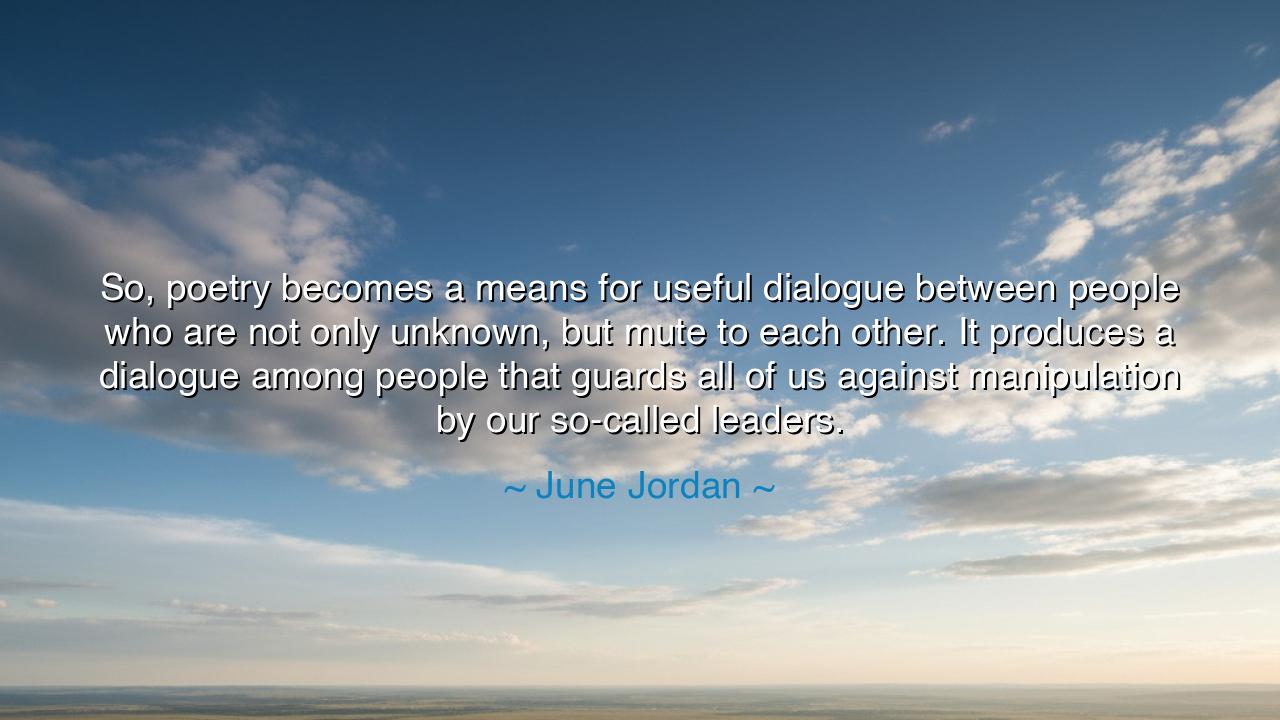
So, poetry becomes a means for useful dialogue between people
So, poetry becomes a means for useful dialogue between people who are not only unknown, but mute to each other. It produces a dialogue among people that guards all of us against manipulation by our so-called leaders.






“So, poetry becomes a means for useful dialogue between people who are not only unknown, but mute to each other. It produces a dialogue among people that guards all of us against manipulation by our so-called leaders.” Thus spoke June Jordan, the fierce voice of truth, who saw poetry not as decoration but as weapon, as shield, as bridge. Her words remind us that poetry is not merely a private act of expression, but a public act of resistance and connection, binding together those who otherwise remain strangers, silenced by the powers above them.
The meaning of this saying lies in the recognition that poetry builds a shared language where none seems possible. Two people, separated by culture, class, or circumstance, may find themselves voiceless before one another. But in poetry, they discover a common tongue. The poem, spoken or read, leaps the barrier of silence and forges a bond of recognition. And in this recognition, people become less vulnerable to the lies and manipulations of those who seek to rule through division.
The origin of Jordan’s insight is rooted in her own struggle. As an African American woman, poet, and activist, she lived in a world where voices like hers were often silenced or ignored. For her, writing was not indulgence—it was survival, and more: it was a way to create solidarity. She understood that when individuals share poems, they resist the isolation imposed by unjust systems. A poem is a spark that says: “You are not alone. I, too, have felt this. I, too, have seen this.” From this spark arises the dialogue that sustains communities.
Consider the example of Pablo Neruda, whose poetry gave voice to workers, lovers, and the oppressed in Chile and across the world. His verses were read aloud in factories, in marketplaces, in gatherings of ordinary people. Men and women who had no political power found in his poems a way to speak and to listen to one another. Through poetry, they became less susceptible to the propaganda of tyrants, because they carried within them a truth deeper than slogans: the shared human cry of dignity.
The lesson here is powerful: if we wish to guard ourselves against the manipulations of false leaders, we must cultivate genuine communication among ourselves. Poetry provides such communication, because it does not speak in the language of power, but in the language of feeling, of imagination, of honesty. It cuts through propaganda by speaking to the heart, where lies cannot take root so easily. This is why Jordan insists on its usefulness—not as escape, but as defense and as dialogue.
Practically, this means we should seek out poetry not only as solitary readers, but as participants in conversation. Share poems with friends, with communities, with strangers. Attend readings, write lines, speak them aloud. Let poetry be a common fire around which people gather, discovering in one another the humanity that politics often denies. When people exchange poetry, they become less malleable, less divided, less mute before the powerful.
Thus the teaching endures: poetry is not only beauty, it is solidarity. It is the dialogue that springs up between the silenced, the language of those who refuse to be manipulated. In the verses of June Jordan we are reminded that poetry guards us—it keeps us awake, alive, and together. Let us then take up the poem as both gift and shield, using it to connect, to resist, and to protect the freedom of our shared human voice.






MHNguyen Manh Hung
I’m curious about the idea that poetry can guard us against manipulation by our leaders. In a world of constant media influence, do you believe poetry has the potential to resist the forces that attempt to control public thought? How can poetry help people critically evaluate the narratives fed to them, and is it enough on its own to make a difference?
NLVu Nguyen Nhat Linh
June Jordan’s quote resonates with me because it highlights how poetry allows people who might not have a voice to engage with each other. But does this mean poetry is inherently political? Can poetry be a universal language that transcends all barriers, or do certain cultural or social contexts limit its ability to connect people meaningfully?
MHNguyen Manh Hung
I find it interesting how poetry is seen as a safeguard against manipulation. In a world where political leaders often spin narratives to suit their agendas, could poetry be the antidote to political rhetoric? But at the same time, can poetry itself be used to manipulate? Or is it inherently resistant to exploitation due to its emotional depth and ambiguity?
KKhanh
The idea that poetry can facilitate meaningful dialogue between people who are otherwise disconnected is thought-provoking. Do you think that in today's digital age, where we are constantly bombarded with information, poetry still holds the power to create genuine conversations? Could it be that we rely too much on short, instant messages instead of deeper, more reflective forms of communication like poetry?